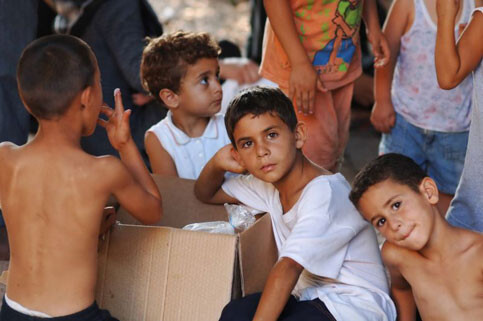IRIN 14 August 2006

Displaced children with a food box they received. Faculty of Law, Lebanese University, Beirut, August 8, 2006. (Dina Debbas/IRIN)
BEIRUT — A hot, daily meal from a Hezbollah-run soup kitchen in Noueiri, south-east Beirut, was how Zeina Khawle managed to feed her children throughout the long weeks of the Lebanese crisis.
A widow, and mother of three, Zeina hosted a displaced family from southern Lebanon in her Beirut home. “There is nobody to help me and I have no money,” she said, flanked by her nine-year-old son Hassan, who on the day IRIN visited, was disappointed that lentil soup was not on the aid menu.
Across Beirut and its devastated southern suburbs, a relief effort organised and financed by Hezbollah has been helping hundreds of thousands of displaced people, according to one of the Islamist party’s officials.
The 34-day conflict started after Hezbollah captured two Israeli soldiers on 12 July. Israel then launched a military offensive that killed 1,109 Lebanese and forced 973,334 from their homes, according to Lebanon’s High Relief Council (HRC) - a government body set up to manage relief efforts.
In southern Lebanon and northern Israel, Hezbollah rockets and gunfire killed almost 160 Israelis during the crisis, and forced thousands of families to take shelter in underground bunkers for weeks.
“If we had been affected by the bombing, we would not have been able to achieve what we have so far,” said Haj Abbas Zaher al-Din, chief Hezbollah relief coordinator for Beirut.
Nonetheless, Zaher al-Din is managing the party’s US $500,000 Beirut relief operation out of a temporary office after its main administrative centre was destroyed by Israeli airstrikes.
Zaher al-Din said Hezbollah had been rehearsing such a relief effort every three months since 2000, when Israel withdrew from southern Lebanon. In the past four weeks, it had registered almost 38,000 displaced families in need, all of whom had fled to Beirut from their homes in southern Lebanon.
More than 8,500 of those families have been sheltering in more than 130 schools across the capital. Their details, including infant milk requirements, were put into a central computer database, said Zaher al-Din.
About 70 percent of some 29,000 displaced families being hosted in private homes in Beirut were also registered with Hezbollah. All received a home visit from one of the 700 staff working across 13 sectors of the capital, said Zaher al-Din.
Deep roots
Hezbollah’s roots go deep into Lebanon’s disenfranchised Shi’ite community, the largest religious group in the country. An examination of the group’s relief efforts reveals substantial financial backing coupled with generous ‘in-kind’ donations.
Zaher al-Din said Hezbollah was providing a box of food supplies to families in need every four days. The supplies are purchased from local traders at wholesale prices and stored in Hezbollah’s own warehouses.
The Shi’ite party also pays US $100 to $300 as a weekly wage for those helping out. “I wanted to earn some extra pocket money, so they got me peeling these onions,” said Ahmed Fneish, a 16 year-old displaced boy.
Originally from the southern Lebanese village of Maaroub, he was working at the soup kitchen in Noueiri, which opened on the second day of the conflict.
Fuel shortages after the destruction of nearly all of southern Beirut’s fuel suppliers hampered the operation of the soup kitchen, but the Noueiri kitchen still produced around 500 meals a day.
Besides providing food and jobs, Hezbollah organised sports activities for children, and lecture and prayer sessions for adults.
Zaher al-Din said that Hezbollah had not received any direct aid from any of the international relief organisations now working in Beirut. “Hizbollah considers itself responsible for the people,” said Zaher al-Din.
“From far away, Hezbollah might appear as people carrying AK47s [automatic machine guns], but look closer and you will find we are an organisation centred around educated people striving to give people the chance to live in dignity,” he said.
Hezbollah has been backed by the Bushra Association, a group of 20 businessmen who, since 1993, have been funding relief efforts for those affected by the previous Israeli occupation of Lebanon, from 1978 to 1990.
“The government moved two weeks too late,” said Abbas Noun, a Bushra Association representative who heads an operation that has been running five kitchens across Beirut on a daily budget of up to US $20,000. “Hezbollah has more experience at this sort of operation.”
This item comes to you via IRIN, a UN humanitarian news and information service, but may not necessarily reflect the views of the United Nations or its agencies. All IRIN material may be reposted or reprinted free-of-charge; refer to the copyright page for conditions of use. IRIN is a project of the UN Office for the Coordination of Humanitarian Affairs.
Related Links